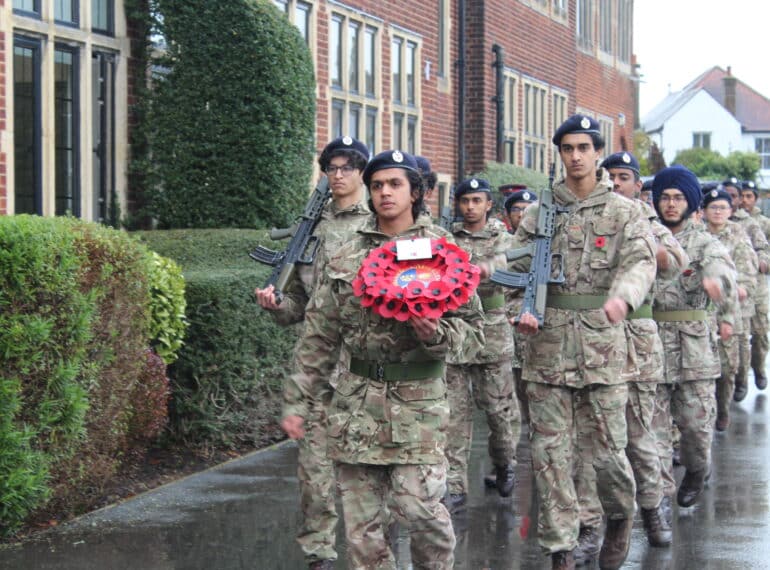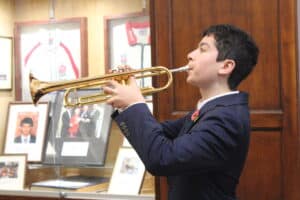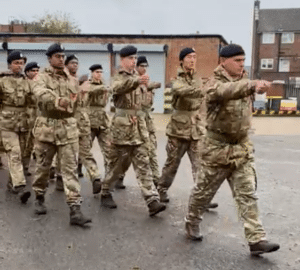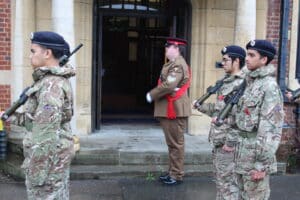
The Combined Cadet Force remembered QE’s own war dead in an act of remembrance at the School, before then playing their part in Sunday’s commemorations in High Barnet.
 One hundred and thirteen old boys of the School died in the First and Second World Wars, while others have been injured and killed in conflicts since.
One hundred and thirteen old boys of the School died in the First and Second World Wars, while others have been injured and killed in conflicts since.
Headmaster Neil Enright said: “On this important day, we remember all those lives lost in conflict, reflecting upon the sacrifices they and others made to secure our freedoms and security.
“We honour the Elizabethans killed in the two world wars, and think, too, of all those affected by conflict around the world.”
On Friday, the School day closest to Armistice Day this year, the whole School paused for a two-minute silence at 11 o’clock.
 The act of remembrance was led by the School’s CCF. The boys marched to the School’s World War I memorial in the Crush Hall before laying a wreath, demonstrating funeral drill they had learned for the occasion.
The act of remembrance was led by the School’s CCF. The boys marched to the School’s World War I memorial in the Crush Hall before laying a wreath, demonstrating funeral drill they had learned for the occasion.
They were overseen by Staff Sergeant Rhys Peto, the CCF’s School Staff Instructor, who is a member of QE’s Facilities Team.
There was a reading from Laurence Binyon’s poem, For the Fallen, from which the Ode of Remembrance is drawn. The Last Post was played by Joel Swedensky, of Year 12, on the trumpet.
 On Remembrance Sunday, 24 cadets turned out, joining High Barnet’s Remembrance Sunday parade, marching from the Army Reserve Centre in St Albans Road down the High Street to St John the Baptist Church, where all attended the church service. Wreath-laying at the war memorial there was carried out by Shubh Rathod and Chinthn Santhalingam, both of Year 13.
On Remembrance Sunday, 24 cadets turned out, joining High Barnet’s Remembrance Sunday parade, marching from the Army Reserve Centre in St Albans Road down the High Street to St John the Baptist Church, where all attended the church service. Wreath-laying at the war memorial there was carried out by Shubh Rathod and Chinthn Santhalingam, both of Year 13.
The School has recently fielded a number of enquiries from the families of Old Elizabethans killed in the two world wars and has been able to use QE Collections to provide them variously with images and information about their relatives from the digital archives.
Among the thousands of artefacts in QE Collections is the speech made by Headmaster E H Jenkins (1930–1961) in 1948 at the dedication service for the School’s World War II memorial. Of the 65 who died in that conflict, 52 had been his own pupils, and, he told the congregation, he remembered them all.
“Their graves are worldwide. In the Far East, in Burmese jungles, on the Western Desert, in the waters that wash around Crete, among the Guards on the Tunisian frontier, in Salerno’s bay, beneath the flak of Berlin, in our own seas… in our own dear homeland, on Normandy beaches, at the crossings of the Rhine – to all of these they have borne, and left to eternity, a part of our Elizabethan heritage. They are gone from us.
 They will not grow old, as we that are left grow old,
They will not grow old, as we that are left grow old,
Age shall not weary them, nor the years condemn,
but we will remember them: we will take up the charge they have left to us, the service of our country and the cause of tolerant freedom which they loved, and for which they died. God helping us, we can do no other. And to masters and boys of this school, as they pass it upon their daily vocations, this bronze, which is now to be dedicated and unveiled, shall be at once a reminder and an inspiration,” Mr Jenkins concluded.
